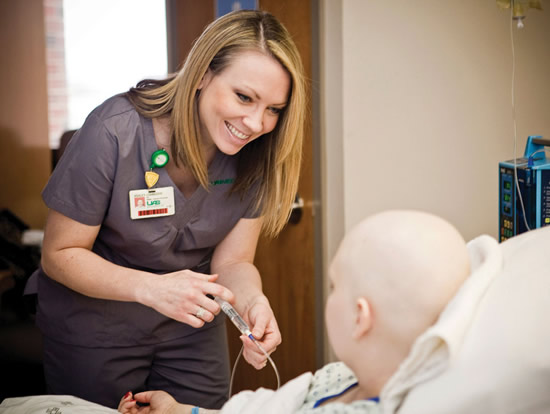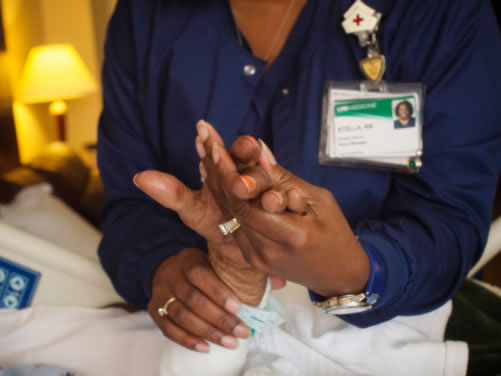 Over the last decade, great strides have been made in cancer treatment, oncology and palliative care across chronic and life-limiting illnesses, however, a shortage of cancer and palliative care providers remains. At the University of Alabama at Birmingham School of Nursing, faculty are preparing highly qualified, well-educated graduates to fill cancer and palliative care workforce gaps, better reach underserved patients with cancer and other life-limiting illnesses and improved quality of care and quality of life through its Oncology Nurse Practitioner and Advanced Palliative Care Nurse Practitioner Subspecialties.
Over the last decade, great strides have been made in cancer treatment, oncology and palliative care across chronic and life-limiting illnesses, however, a shortage of cancer and palliative care providers remains. At the University of Alabama at Birmingham School of Nursing, faculty are preparing highly qualified, well-educated graduates to fill cancer and palliative care workforce gaps, better reach underserved patients with cancer and other life-limiting illnesses and improved quality of care and quality of life through its Oncology Nurse Practitioner and Advanced Palliative Care Nurse Practitioner Subspecialties.
“UAB Hospital is a major referral center for cancer and other life-limiting illnesses, and it’s not uncommon for people to travel several hours to get here,” said Oncology Nurse Practitioner Subspecialty Coordinator and Assistant Professor Richard Taylor, DNP, CRNP, ANP-BC, “but it is important that patients can go back to their primary communities to receive treatment and management. Otherwise, there’s a psychological and financial drain on them from having to stay here or just come back and forth. Creating highly qualified oncology and palliative care nurse practitioners fulfills the School’s mission of closing gaps in provider access and providing care to underserved populations.”
Professor and Marie L. O’Koren Endowed Chair Marie Bakitas, DNSc, CRNP, NP-C, AOCN, ACHPN, FAAN, is an internationally recognized clinical researcher who has advanced study and application of palliative care for those with cancer, heart failure and other life-limiting illnesses. As a primary investigator on a T32 training grant from the National Institutes of Health, Bakitas and other UAB faculty have trained more than 150 pre- and post-doctoral fellows with a focus on cancer prevention, control and survivorship.
This grant supports the UAB Cancer Prevention and Control Training Program (CPCTP), a bridge for students from diverse backgrounds who seek research careers in cancer prevention and control. By focusing on these students, the program creates a diverse field of researchers with a commitment to advancing cancer prevention and control.
Bakitas’ program of research focuses on reducing suffering and enhancing quality of life for individuals with advanced illness and has led to the advancement of palliative care across disease processes. Previously utilized in an oncology setting as end-of-life care, Bakitas’ research has expanded palliative care use to before end-of-life and made it accessible to vulnerable and underserved populations with other advanced illnesses.
 “Research shows that palliative care is an important part of cancer treatment. It improves quality of life and outcomes by addressing the whole patient, not just their disease,” Bakitas said. “Access to and understanding of palliative care, however, are limited, and we know a lot of individuals who would benefit from palliative care are not receiving it. At UAB School of Nursing, we have several faculty members studying palliative care for life threatening diseases and working to improve access for underserved, rural and minority populations.”
“Research shows that palliative care is an important part of cancer treatment. It improves quality of life and outcomes by addressing the whole patient, not just their disease,” Bakitas said. “Access to and understanding of palliative care, however, are limited, and we know a lot of individuals who would benefit from palliative care are not receiving it. At UAB School of Nursing, we have several faculty members studying palliative care for life threatening diseases and working to improve access for underserved, rural and minority populations.”
The School’s Oncology Nurse Practitioner and Advanced Palliative Care Nurse Practitioner subspecialties are distance accessible and can be completed during or after earning a Master of Science in Nursing (MSN) or in conjunction with the Doctor of Nursing Practice (DNP) degree.
MSN students can select a number of track options for their primary specialty, including family, adult-gerontology primary care and acute care, psychiatric/ mental health and women’s health nurse practitioner tracks. Most advanced practice nurse practitioner specialties, with the exception of pediatric and neonatal nurse practitioner specialty track, can continue to the Oncology and Advanced Palliative Care Nurse Practitioner subspecialties.
“In the South and Southeast, many rural and underserved populations lack access to palliative and oncology care,” Bakitas said. “By offering these subspecialties, the UAB School of Nursing is rising to the challenge and meeting the needs of communities where these services need to be expanded.”
As post-MSN offerings, these subspecialties support further specialization and prepare graduates to enter oncology and palliative care advanced practice nursing positions across cancer and other life-limiting illnesscare settings, said Advanced Palliative Care Nurse Practitioner Subspecialty -Coordinator and Assistant Professor Rebecca Edwards, DNP, APRN, ACNP, AOCNP, AOCNP. The curriculum utilizes School’s state-of-the-art technology and the resources of UAB Hospital and Health System to provide innovative educational experiences in this preparation.
“We’re developing simulation and interdisciplinary experiences for students so that they can solidify what they learn in their didactic courses and translate that into practical skills,” Edwards said. “Being at UAB, with the National Cancer Institute-designated O’Neal Comprehensive Cancer Center, interdisciplinary expertise, extensive training and experts are easily accessible. All of those resources and people help us in our courses and collaborate with us to tailor all the content and experiences for the students.”
Curriculum, Edwards added, is centered on the latest standards from the Oncology Nursing Society (ONS), the American Society of Clinical Oncology (ASCO), and the National Comprehensive Cancer Network (NCCN), and in addition to textbooks, faculty employ the latest literature and most recent research, keeping students up to date with the latest trends in care.
Educating the next generation of nurse practitioners creates providers who can fill gaps of care in communities, provide symptom management closer to home and deliver care for the whole patient. Nurse Practitioners graduate ready to work collaboratively with oncology and palliative care teams, managing holistic care of patients with cancer or life-limiting illnesses in a variety of settings.
“Palliative care is an important aspect of care for patients with life-limiting illnesses long before they reach end-of-life,” Edwards said. “There is a tremendous need for providers who can provide palliative care, and providing this subspeciality expands the number of highly qualified, experienced providers in the field.”
“Oncology and palliative care are unique, just as women’s heath or pediatrics are. The Oncology and Advanced Palliative Care Nurse Practitioner subspecialties create a workforce that is able to provide a depth to care, from screening, through diagnosis, treatment, survivorship, and end -of-life,” Taylor added.